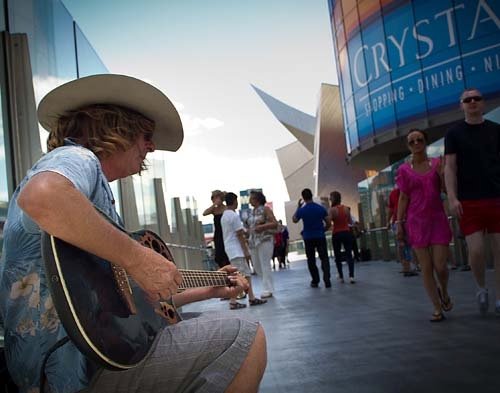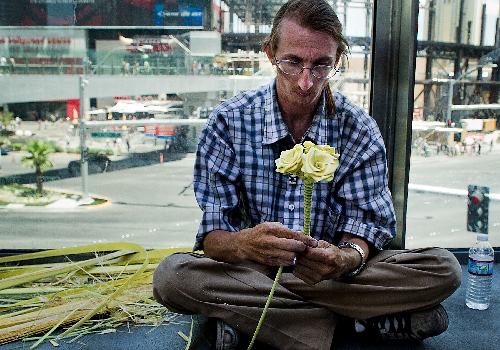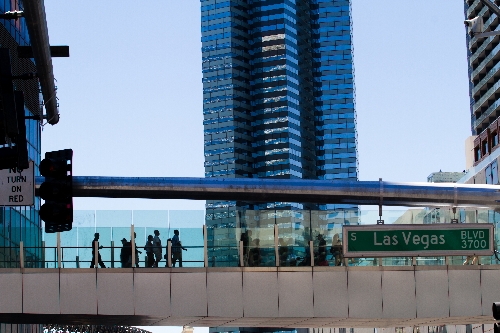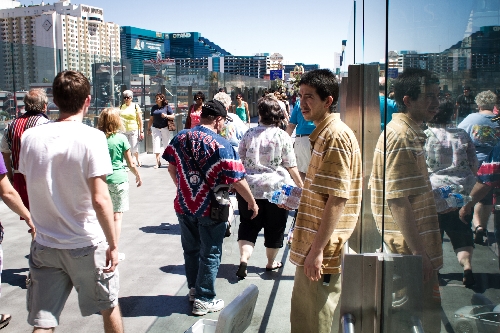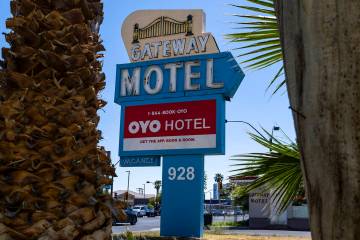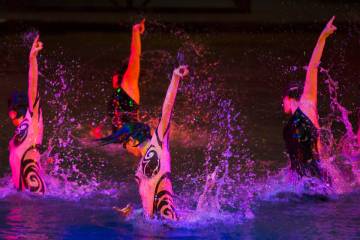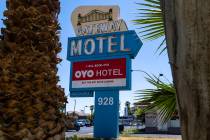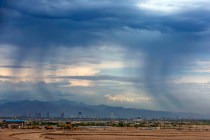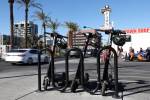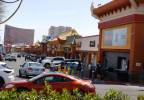Vendors, performers flout law, crowd Strip walkways
Edgar Saul jolts when he hears the siren.
He chose this spot on the pedestrian walkway between the Tropicana and Excalibur specifically for the vantage point it gave him of the Strip. He'll see the cops coming, and he will have a chance to run.
False alarm, this time. It's only an ambulance trying to cut through Strip traffic. Saul laughs, his teeth a gleaming white strip in his suntanned face.
He cheerfully returns to breaking the law.
"Water, $1," he calls out to passing tourists. Every fifth or sixth person stops, digs in pockets or purse for change or peels dollars off of wads of bills. In return, Saul reaches into his blue cooler and pulls out a dripping, icy bottle of water. Drinking it on a scorching day like this recent Thursday must feel like hitting a royal flush.
Saul, 39, is one of a small army of unlicensed vendors that has invaded the Strip's pedestrian walkways in recent years. Sometimes they line up three or four in a row, their attempts to hawk their illegal wares, play their music or perform drowning each other out.
Hawkers, water pirates, criminals. Buskers. Unlicensed vendors. Whatever you call them, they were largely nonexistent during the Strip's adult Disneyland heyday. Now, they are a sign of the times.
When the first pedestrian walkway was built at Tropicana Avenue and Las Vegas Boulevard in 1994, it significantly improved traffic flow and decreased pedestrian accidents, Clark County public works director Dennis Cederburg says.
Over the years, a total of 14 elevated walkways have been constructed along the Strip. A 1996 county study estimated that as many as 100,000 pedestrians a day will use a walkway during peak hours.
While the walkways help keep problems from developing on the streets, these sky-high sidewalks have come with their own set of issues.
"They're elevated, so some of the criminal element believes they can conduct their activities up there and out of sight," Las Vegas Metropolitan Police Sergeant Chulawudt Baker says. "They'll see us coming; they'll take off running."
True, Saul says. If he sees the police, he packs up, hides his blue cooler and extra bottles of water in the bushes and waits for the all-clear. When the police are gone, he goes right back to selling his water.
Saul is a jumpy fellow. Originally from El Salvador, where he served in the army, Saul left his country, his wife and three children 11 years ago in search of a better life in the United States. Every week, he sends money home to them.
"Before I left, I prayed. I said to God, 'You're my Father. I need a different life. Give me a chance. If you no help me, I hang myself,' " Saul says.
He started selling water on the pedestrian walkways last year after losing his construction job. He knows it's illegal; Saul's been ticketed and even arrested for doing business without a license.
"Last week, I stayed in jail for four days," he says.
The fine is $200 for such a charge, but Saul has no steady income, assets or even identification. He always ends up back on the walkways selling water, even knowing that the police will come again. The money is too easy. On a good day, he'll make $100.
The walkways are veritable gantlets of people trying to make a buck: dancers, singers, guitar players and vendors. Some sell T-shirts for concerts or sporting events, while others sell sunglasses and tickets to shows. Their presence is taking income away from valid businesses and public coffers because they pay no licensing fees or taxes. The water vendors are unique in that they present a health hazard. Some have run a scam in which they refill empty plastic bottles, glue the lid on and sell it as a new bottle of water, Baker says. When customers open the lid, it snaps and can seem like the seal is being broken for the first time.
There was a time when police didn't hassle the water sellers, says Steve Pleasant, 43. He started hawking bottled water for $1 in 2007 after losing his job in construction. He had taken his wife and kids to the Sirens of TI and saw a guy with his cooler on the Strip.
"I asked him how much he made. The next day, I was out here with my own cooler and water," Pleasant says. That guy told Pleasant he made $200 a day.
Pleasant says he makes $400 to $500 on average during the summer. His best day was last year when he raked in $1,000.
In 2009, a water seller hit a homeless man while they both vied for money on a pedestrian bridge. The man later died of his injuries. After that, Pleasant says, the police started citing him for doing business without a license. Last June, he went to jail 21 days in a row for selling water.
"I've got a stack of tickets at home. I've got a stack of failure-to-file letters from the D.A.," says Pleasant, who has gotten off with little more than a fine for breaking the law.
It's a daily battle for police, Baker says. They receive complaints from casinos and people about aggressive tactics employed by some unlicensed vendors or performers. Right now, there is little to deter people from coming back again and again after getting arrested. The money they make is too good.
But the police are working with the district attorney's office to start prosecuting some of the worst offenders, Baker says. Eventually, they hope that a person's arrest or citation record will follow him so that when he is detained multiple times, the punishment can be increased accordingly.
Contact reporter Sonya Padgett at spadgett@reviewjournal.com or 702-380-4564.



